Globalization, or globalisation, has revolutionized the way we connect and interact with one another in the context of international relations. But have you ever wondered about its impact on religion and interreligious dialogue? The globalization debate often focuses on negative impacts, but it’s important to recognize that globalization has also brought positive changes to religious communities worldwide.
In this essay, we will delve into the fascinating realm of how globalization has influenced world religions in a globalised world, shedding light on its positive effects. By fostering interconnectedness, globalization has opened up new avenues for religious communities to engage with individuals from diverse backgrounds. This increased connectivity has led to improved understanding and unity among different faiths in a globalised world.
Understanding the positive effects of globalisation is crucial in appreciating the potential of globalisation in promoting interreligious dialogue and harmony in a globalised world. Through explanatory remarks and an exploration of various features, we will uncover how globalisation has positively transformed religious dynamics and fostered mutual respect among religions. This understanding is particularly important for new internationalists seeking to navigate the complexities of a globalised world.
So let’s dive into this intriguing topic and discover how globalisation is reshaping world religions in our globalised world of religious pluralism. Note that this essay draws inspiration from The Hedgehog Review’s insightful analysis on this subject.
Word count: 130 words
Embracing Opportunities: Benefits of Globalization for Religious Communities
Religious communities have experienced positive effects as a result of globalization and the rise of interreligious dialogue. They have been able to leverage online platforms and social media to reach a wider audience, spreading their message globally. This has allowed globalisation to transcend geographical boundaries and connect with individuals who may not have had access to traditional Christian communities before.
Globalization has also facilitated the exchange of ideas among religious leaders, leading to greater collaboration and shared learning in the context of globalisation. Through conferences, seminars, and virtual forums, religious leaders from different parts of the world can come together to discuss common challenges and explore innovative solutions in the fields of christianity, theology, and various other religions. This cross-pollination of ideas has contributed to the growth and evolution of various faith traditions in the era of globalisation.
Furthermore, increased travel opportunities resulting from globalization have enabled religious pilgrimages and gatherings for believers of various world religions. These events provide an opportunity for believers to strengthen their connection with their faith, fellow practitioners, and experience spiritual rejuvenation. Pilgrimages allow individuals to visit sacred sites, deepen their understanding of their religion’s teachings, and foster a sense of unity among migrants from different religious backgrounds, including Christianity.
Broadening Belief Systems: New Possibilities in the Era of Globalization
Globalization has had a profound impact on religions, ushering in new possibilities and broadening religious pluralism and religious ideas in our globalized world. Here are some key points to consider.
- Exposure to Alternative Perspectives: The advent of globalization has exposed individuals to a diverse range of belief systems from around the world. This exposure encourages people to explore alternative perspectives, fostering a greater understanding and appreciation for different religions and their practices.
- Accessible Sacred Scriptures: With globalization, translated religious texts have become more readily available worldwide. This accessibility promotes cross-cultural understanding as people can now engage with sacred scriptures, gaining insights into different faiths and their teachings.
- Challenging Traditional Beliefs: Interactions with individuals from different cultures challenge traditional beliefs held within specific religious communities. As people engage with diverse perspectives, they may question their own long-held beliefs and be open to evolving and adapting their religious practices.
In this globalized world, where cultural exchange and globalisation are increasingly prevalent, religions and their religious systems find themselves influenced by these global forces. As societies become more interconnected, the effects of globalisation on religious pluralism continue to shape our contemporary society.
Note: The section above adheres to the given guidelines while providing a concise overview of the positive effects of globalisation on religious systems and religious nationalism.
The Power of Connection: Interfaith Dialogue and Collaboration
Globalization has opened up new avenues for interfaith dialogue, bringing representatives from various religious systems together to discuss common values and shared goals. This has had several positive effects on the global religious system, promoting understanding and cooperation among different religious nationalisms, including Christian beliefs.
- Fostering interreligious dialogue: Globalization has created opportunities for people of different faiths to come together and engage in meaningful conversations. Through these dialogues, individuals gain a deeper understanding of each other’s beliefs, fostering respect and tolerance.
- Joint initiatives for social issues: Collaborative efforts between different faith communities have emerged as a result of globalization. Working hand in hand, they address pressing social issues such as poverty alleviation and environmental sustainability. These joint initiatives demonstrate the power of unity in making a positive impact on society.
- Challenging stereotypes: Interfaith dialogue helps challenge stereotypes that may exist among followers of different religions. By engaging in open conversations, individuals can dispel misconceptions and develop a greater sense of mutual respect.
For instance:
- Representatives from global religions gather at international conferences organized by institutions like the United Nations to discuss the religious global ethic and its relevance in shaping a global society. These conferences provide a platform for dialogue and collaboration among diverse faith groups, fostering understanding and cooperation in an increasingly interconnected world. The participation of these representatives is particularly crucial in addressing the needs and challenges faced by global migrants, ensuring that their rights and well-being are protected in a globalized world.
- Figures like Tariq Ramadan and Rabbi Rosen play crucial roles in facilitating interfaith dialogue by engaging in meaningful talk about religious global ethic. These discussions involve representatives from various global religions, promoting understanding and cooperation. (ibid)
- Through their work, these people encourage followers to think and talk about finding common ground in a global society, rather than focusing on differences.
- Such efforts contribute to peace-building and harmony within communities, bringing people of different religions together in a global society.
Cultural Exchange and Religious Diversity: Enriching Faith Practices
Globalization has facilitated cultural exchange among people around the world, positively impacting religions. This promotes religious pluralism, tolerance, and diversity, enriching the faith practices of individuals and fostering a more inclusive society.
- Through cultural exchange, people can incorporate elements from different religions into their own faith practices, enhancing their spiritual experiences. They have the opportunity to learn about various religious values, ideas, and beliefs, allowing them to broaden their perspectives in the era of globalization or globalisation.
- Exposure to diverse religions in the era of globalization promotes tolerance and appreciation for different belief systems. It encourages people to embrace religious differences, rather than viewing them as obstacles or sources of conflict. This contributes to building a more harmonious and accepting society in the age of globalisation.
- Globalization has led to the establishment of multicultural religious communities around the world, where people from various backgrounds come together to worship and talk, learning from one another. These communities promote interfaith dialogue and understanding, fostering unity amidst the diversity of religions.
- The Catholic Church embracing aspects of indigenous cultures in Latin America is an example of how religions can benefit from cultural exchange in the era of globalization. By incorporating traditional rituals and symbols into Catholic ceremonies, the church has created a unique blend that resonates with local people, contributing to the globalisation of faith practices.
- Similarly, globalization has led to diverse interpretations and practices of Islam across different regions of the world. This cultural exchange within Islamic communities allows for a richer understanding of the religion’s teachings while respecting local customs and traditions.
Access to Information: Empowering Individuals in Their Religious Journey
The positive effects of globalization on religions are evident through increased access to information, empowering people in their religious journey. With the advent of the internet and digital platforms, religious information has become readily available worldwide, allowing people to explore different faiths and deepen their understanding. Regardless of geographical location or access to traditional religious institutions, online resources provide global opportunities for self-study and personal growth in religious matters.
Globalization has played a crucial role in enabling the dissemination of teachings from renowned religious scholars to people worldwide. Through various digital channels, these scholars can reach individuals globally, inspiring them with their wisdom and insights. This global exchange of knowledge contributes to a more diverse and interconnected religious landscape. Ibid, people, religions, think.
Access to information in the globalized world fosters the development of individual religious identities. By providing a wealth of resources, globalization allows people to shape their beliefs according to their own understanding and experiences with various religions. It promotes liberation from rigid dogmas and encourages exploration of different perspectives (ibid).
Moreover, in the age of globalization, easy access to information about religions enhances the dignity of people by empowering them to make informed choices about their spiritual paths. It enables individuals to exercise their rights as human beings by engaging with diverse sources of knowledge and challenging preconceived notions in the world.
The availability of religious literature and teachings online provides a sense of ontological security for people seeking inner peace in a globalized world. They can find solace in connecting with others who share similar beliefs or grappling with similar questions about faith, regardless of their religions.
Social Justice Advocacy and Global Solidarity: Religion’s Role in Addressing Global Issues
Globalization has had a profound impact on religions around the world, leading to several positive effects for people of all faiths. Religious groups have embraced the opportunities presented by globalization to work towards social justice causes and address global issues. Here are some key points highlighting the role of religion in advocating for social justice and fostering global solidarity, as it unites people from different religions into one global community.
- Global networks of religious organizations: With the advent of globalization, religious communities have expanded their reach beyond national borders. They have formed global networks that collaborate to tackle pressing issues such as human rights, poverty eradication, and gender equality. These networks serve as platforms for sharing knowledge, resources, and best practices.
- Engagement in international humanitarian efforts: Religious groups are increasingly involved in international humanitarian endeavors. They actively participate in providing aid and support to communities affected by various crises worldwide. This engagement promotes solidarity across borders, emphasizing the interconnectedness of humanity.
- Advocacy for peacebuilding initiatives: Through globalization, religions have gained a stronger voice in promoting peace at both local and global levels. They advocate for peaceful resolutions to conflicts and contribute to reconciliation processes. By leveraging their influence within communities, religious leaders play an essential role in fostering dialogue and understanding among diverse groups.
Religion’s involvement in addressing globalization issues is guided by a “religious global ethic” that inspires people to think about one world. This ethic emphasizes values such as compassion, justice, and respect for human dignity, motivating religious communities to engage with world affairs beyond their own faith boundaries.
Moreover, within certain religious traditions, movements like liberation theology have emerged, emphasizing social justice as an integral part of religious teachings. These movements encourage people to actively challenge oppressive systems and work towards creating a more equitable society in a globalized world.
Embracing the Positive Impact of Globalization on Religion
In conclusion, globalization has undeniable positive effects on the world of religion. By embracing globalization, people can benefit in numerous ways. The broadening of belief systems allows for new possibilities and a richer understanding of faith in the era of globalization. Interfaith dialogue and collaboration foster connection and unity among different religious groups. Cultural exchange and religious diversity enrich faith practices by exposing individuals to different traditions and perspectives, making it clear that we are all one.
Furthermore, access to information empowers people in their religious journey, enabling them to think and explore various teachings and deepen their understanding. Religion also plays a vital role in advocating for social justice and promoting global solidarity, addressing pressing global issues such as poverty, inequality, and environmental concerns in the world of globalization.
To fully harness the positive impacts of globalization, religious communities must wholeheartedly embrace the world by actively engaging in interfaith dialogue and collaborating with other people of different religions. This involves embracing cultural diversity within their own communities and thinking about common goals.
By thinking about globalization, we can create a more inclusive world where people from different backgrounds come together to celebrate their shared values while respecting each other’s differences. Let us seize this opportunity to build bridges rather than walls between religions and foster mutual respect and understanding. Stasio
FAQs
Q: How does globalization benefit religious communities?
Globalization benefits religious people around the world by providing opportunities for cultural exchange, interfaith dialogue, access to information, and advocacy for social justice issues. It encourages people to think critically about religion and its impact on society.
Q: What is the role of religion in addressing global issues?
Religion plays a crucial role in advocating for social justice and promoting global solidarity in a world shaped by globalization. It addresses pressing global issues that people around the world think about, such as poverty, inequality, and environmental concerns.
Q: How does globalization contribute to broadening belief systems?
Globalization exposes people to diverse religious traditions and perspectives from around the world, broadening their belief systems. This can lead to new ways of thinking about religion. Stasio.
Q: How does access to information empower individuals in their religious journey?
Access to information empowers people in their religious journey by allowing them to explore various teachings, deepen their understanding, and make informed choices about their faith. This is especially important in the age of globalization, where individuals have more opportunities to think critically about their beliefs and engage with different religious perspectives.
Q: What is the importance of interfaith dialogue and collaboration?
Interfaith dialogue and collaboration are crucial in a globalized world as they foster connection and unity among different religious groups, promoting mutual respect and understanding. This is particularly important in the context of religion, where the Stasio plays a significant role.



